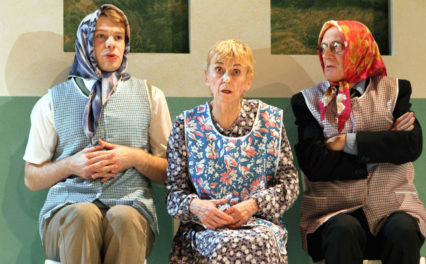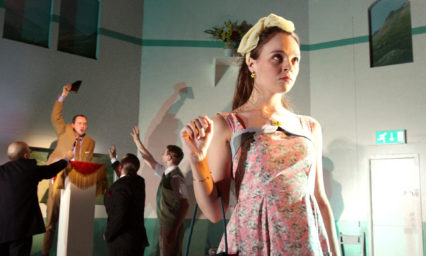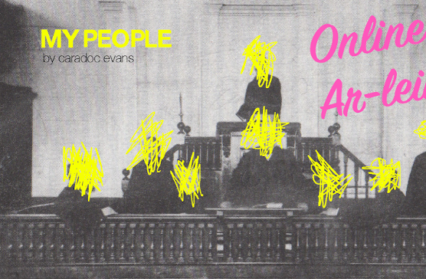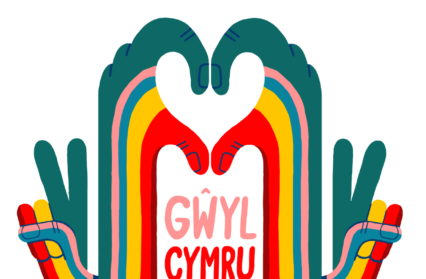Phil Morris reviews My People, a recording of the 2015 show adapted by Steffan Donnelly from the fiction of Caradoc Evans and co-produced by Invertigo Theatre and Theatr Clywd.
Once you strip theatre of its defining characteristics of contemporaneity and presence what is the point in livestreaming a play? Not much, to judge from the plethora of ho-hum monologues performed in a so-so style, which is neither stage nor screen acting, which have grown up like Japanese knotweed across my social media. Theatre is in an existential crisis and every theatre artist wants to scream from every mountain-top what they fear is going to be lost to the Covid crisis and government indifference. So, a plenitude of micro-commissions have micro-funded an abundance of works in the vain hope that it is possible somehow to show what we are all missing at the closure of our venues by digitally broadcasting what amounts to low-fi hum-drum television.
 Invertigo Theatre have made a recording of their 2015 show ‘My People’, co-produced with Theatr Clwyd, available for streaming from their website until July 3rd, as have other companies bereft of live audiences and the firm promise of future re-opening. Such online content therefore often serves as a defiant response to the turmoil and uncertainty of our current moment; declaring there is something of value that we once created, and we will create again. For theatre fans looking for more than solemn talking heads, Invertigo’s digitised document of their show happily attests to that other characteristic of theatre in performance – the exuberance and vitality of dramatic storytelling.
Invertigo Theatre have made a recording of their 2015 show ‘My People’, co-produced with Theatr Clwyd, available for streaming from their website until July 3rd, as have other companies bereft of live audiences and the firm promise of future re-opening. Such online content therefore often serves as a defiant response to the turmoil and uncertainty of our current moment; declaring there is something of value that we once created, and we will create again. For theatre fans looking for more than solemn talking heads, Invertigo’s digitised document of their show happily attests to that other characteristic of theatre in performance – the exuberance and vitality of dramatic storytelling.
The founding myths of Welsh identities, from The Mabinogion to the present day, have been a frequent inspiration for this exciting and inventive young company. In Caradoc Evans’ notorious collection of short fiction ‘My People’, writer-director Steffan Donnelly discovered a rich source text in which the duality of the Welsh – hedonism versus puritanism, pub versus chapel, sexual desire versus guilt and self-loathing – is examined with scabrous humour and a pitiless author’s eye. Invertigo’s stage adaptation of these stories is set in the present-day and framed by a non-conformist preacher’s sermon against Evan’s work “full of violence, bad caricatures and slander”. Railing against the twin threats of encroaching materialism and atheism, he commands his congregation to “look our enemy in the eye” by reading aloud stories from ‘My People’. Very quickly, the anti-religious parables exert a perverse fascination on the minds of these chapel goers, who descend into a collective delusional mire of superstition, lust and violence.
 Donnelly’s narrative conceit – and inventive staging from the playwright in collaboration with co-director Aled Pedrick – allows a nimble interweaving of individual tales to form a larger picture of early twentieth-century rural Wales. Caradoc Evans was vilified upon publication of My People: Stories from the Peasantry of West Wales in 1915, ten years after the Welsh Revival of nonconformist Christianity, which would fill the churches and chapels of Wales for decades to come. A contemporary critic in The Western Mail wrote that Evans, “would appear to have raked in the garbage of the countryside for his characters”. The author’s view of ‘his’ people was unsentimental and unflinching. He depicted the religion of the Welsh as both repressive and regressive – akin to the impact of the Catholic Church upon the Irish right up until recent times. Throughout his stories, the rather abstract pieties of the preacher and his congregation are shown to be largely ineffectual in addressing the pressing social concerns of poverty, meanness and hypocrisy. A large swathe of the Welsh population repudiated this vision of their society, while some critics compared Evans to writers such as Zola, Joyce and Gorky.
Donnelly’s narrative conceit – and inventive staging from the playwright in collaboration with co-director Aled Pedrick – allows a nimble interweaving of individual tales to form a larger picture of early twentieth-century rural Wales. Caradoc Evans was vilified upon publication of My People: Stories from the Peasantry of West Wales in 1915, ten years after the Welsh Revival of nonconformist Christianity, which would fill the churches and chapels of Wales for decades to come. A contemporary critic in The Western Mail wrote that Evans, “would appear to have raked in the garbage of the countryside for his characters”. The author’s view of ‘his’ people was unsentimental and unflinching. He depicted the religion of the Welsh as both repressive and regressive – akin to the impact of the Catholic Church upon the Irish right up until recent times. Throughout his stories, the rather abstract pieties of the preacher and his congregation are shown to be largely ineffectual in addressing the pressing social concerns of poverty, meanness and hypocrisy. A large swathe of the Welsh population repudiated this vision of their society, while some critics compared Evans to writers such as Zola, Joyce and Gorky.
Invertigo’s cast of six economically evoke a gallery of characters, commendably avoiding cliché, in a few effectively stylised brushstrokes. Michael Geary is particularly powerful as the tyrannical patriarch ‘Sadrach the Large’, eight of whose nine children are represented by toys operated as puppets. Donnelly and his company succeed impressively in bringing to life Evans’ worldview, in which a biblical story like that of Cain and Abel is both an epic tale of God and man, and at the same time, a domestic tragedy concerning two brothers, the eldest driven by envy and spite to murder the younger. Evan’s prose is biblical in tone and redolent of the muscular poetry of the King James Bible. For example, a young pregnant girl being interrogated by her gossipy judgemental elders stands, “as mute as a sheep in the hand of the shears”. The company ensemble performs with comparable vigour as the show climaxes in a hallucination of corruption, sex and murder, aided by expressionistic lighting from Malcolm Rippeth.
 Ultimately, the intensity of this production is regrettably a matter of conjecture when viewed through a computer screen, removed by time and place. It also has to be said that ‘My People’ fails to some extent in establishing the relevance of Christianity to the question of modern Welsh identity. We continue to sing Bread of Heaven but only at the rugby and seldom in Church, and whereas hypocrisy and greed remain afflictions in contemporary Wales the notion of a God who sits in judgement of our sins is no longer omnipresent. As the preacher asserts, “We’re not like the people in this book” at the close of the play it does not sound like a question. What Donnelly’s adaptation does draw from the original text, however, is a recurring theme of women’s bodies being controlled by men, of female sexuality being blamed and punished for the lust it inflames, that chimes with our current MeToo debates.
Ultimately, the intensity of this production is regrettably a matter of conjecture when viewed through a computer screen, removed by time and place. It also has to be said that ‘My People’ fails to some extent in establishing the relevance of Christianity to the question of modern Welsh identity. We continue to sing Bread of Heaven but only at the rugby and seldom in Church, and whereas hypocrisy and greed remain afflictions in contemporary Wales the notion of a God who sits in judgement of our sins is no longer omnipresent. As the preacher asserts, “We’re not like the people in this book” at the close of the play it does not sound like a question. What Donnelly’s adaptation does draw from the original text, however, is a recurring theme of women’s bodies being controlled by men, of female sexuality being blamed and punished for the lust it inflames, that chimes with our current MeToo debates.
While the relevance of Caradoc Evans’ fiction to modern Welshness is only explored tangentially in Invertigo’s centenary celebrating production, their work brings to life the writers oddly compelling blend of biblical language, mordant social satire, rural superstition and dark magic. This streamed performance may not be theatre, but it does powerfully suggest the capacity of theatre to hold us tightly in the grip of a story. It made me read Caradoc Evans again. It made me yearn even more fervently for the eventual return of live performance.
My People is available to watch online until Friday the 3rd of July on the Invertigo Theatre website.
Phil Morris is a regular writer at Wales Arts Review.












